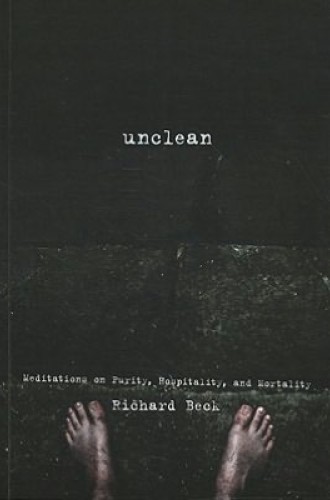Unclean, by Richard Beck
The man stumbled into the Sunday morning service drunk. He was bleeding heavily from his hand and left bloody handprints on the door and then on the pew. Just as he arrived, we were gathering at the altar for the Eucharist. Before anyone had time to react, he was standing with us at the altar to receive the sacrament. The man was not a stranger to any of us. He had taken communion in this very spot before. He had delighted us with his wit and warmth. We knew him by name, and we knew he had a drinking problem, but it hadn’t quite manifested itself in this way. As the priest distributed the Eucharist, he said loudly, “I have hepatitis C.” At that moment, we had no time for abstract questions about the nature of the Christian sacrament, of eucharistic theology or of the significance of the “Body of Christ,” but we did have a sudden need for answers. Should we commune with him or not? What would it mean to reject communion with him? What would it mean to walk away? What would it mean to send him away?
I remembered this scene vividly as I read Richard Beck’s book Unclean: Meditations on Purity, Hospitality, and Mortality. Beck begins with Jesus’ words to the Pharisees in Matthew 9, “Go and learn what this means, ‘I desire mercy, not sacrifice.’” Jesus gave this direction to those who were scandalized by his presence at the table with “many tax collectors and sinners.” He assumed that the meaning of “I desire mercy, not sacrifice,” a quotation from the prophet Hosea, was not self-evident. It would require time and attention on the part of the Pharisees to “go and learn” what it means. Beck aims to follow Jesus’ direction and unravel this puzzle, using both contemporary psychological science and theological reasoning.
Read our latest issue or browse back issues.
Beck sees mercy and sacrifice as “two impulses pulling in opposite directions” and as “intrinsically incompatible.” One reaches outside the boundaries of human societies to be inclusive and welcoming. Mercy is inherently hospitable. The other, sacrifice, withdraws for the sake of maintaining its boundaries. Sacrifices, in the ancient sense, are made to purify the individual or the community making them, and purity can never be a fundamentally welcoming impulse. The implications of this divide are present in every Christian church and at every eucharistic table. Who is included? Who is excluded? What are the limits of mercy? What are the failings of sacrifice?
Beck approaches these questions from a unique direction. He begins by describing a classic psychological experiment on the emotion of disgust. Spit into a cup. Imagine a small cupful of such spit. Would you drink it? For the vast majority of people tested in psychological experiments, the answer is no, even if the cup contains one’s own spit. Once spit is removed from the mouth, it can’t go back in. It has become disgusting. Disgust, Beck says, is a deeply ingrained, but also learned, human response. Small babies put everything in their mouths without distinction. They might not like those things once they get there, but they have no cause to reject anything out of hand. Disgust is universal; all humans express it. But it is also cultural. Different cultures find different things inherently disgusting—too repugnant to put into the mouth. Beck calls disgust that has this biocultural dimension “core disgust.” It focuses primarily on “oral incorporation.”
Although this kind of disgust seems far removed from religious experience, Beck points out its associations with the Eucharist. The Eucharist asks us to incorporate something that might not be disgusting on the surface but that is associated with both body and blood—two things that are indeed disgusting to incorporate. In its most central ritual, Christianity is absorbed in the question of disgust and purity.
As symbolic and metaphorical creatures whose experience of the world is created to a large degree by language, humans extrapolate from the physical aspects of disgust to what Beck calls the sociomoral. Sociomoral disgust involves people whom we perceive to belong inside or outside of our circles.
Just like core disgust, sociomoral disgust has significant eucharistic associations. At the table, we are called to “welcome each other as Christ has welcomed us.” Christ did not find our human impurity reason to dissociate from us. Instead, he took on the challenge of life in the human body and extended his reach outside the boundaries of his community (the Trinity), welcoming all, regardless of purity, into his fellowship. Thus, in the Eucharist, Christ continues to teach us what it means to welcome one another.
Lofty words. But as a lifetime member of the clergy, Beck knows that churches are often enclaves and cliques, and he is concerned about the importation of “contamination-based” reasoning into the life of the church. We do this importation unconsciously, and doing it is certainly very human, but it also works against the very nature of Christianity, which is founded on hospitality and the willing “contamination” of Jesus.
Beck considers contamination-based reasoning to be a kind of “theological sweet tooth.” It is a natural impulse to like the way purity-based thinking feels. Such thinking is self-justifying and creates feelings of security and connection with others. Beck writes that the church will always be “swimming against the tide of disgust psychology, always tempted to withdraw, separate and quarantine.” But we must fight against this tide through practices like the Eucharist that teach us physically and psychologically to desire mercy, not sacrifice—to overcome our tendency to reject and repel others.
Although Beck understands the modern psychological bent toward “healthy boundaries,” toward creating what philosopher Charles Taylor calls the “buffered self,” he doesn’t set much store by it theologically. He is concerned that Christians might borrow this language too thoroughly and let this version of the self—always in need of more and better boundaries—distort ancient teaching that the self must be surrendered in the work of love.
The final kind of disgust that Beck addresses is “animal-reminder” disgust. This kind of disgust arises when we encounter ideas, people or realities that remind us of our own deaths—that we are “dust and to dust we shall return.” The scandal of the incarnation is the idea that the divine is linked to the animal. Humans are part animal and part spiritual beings, Beck reasons, and they can consider their condition from either perspective. Many of the things that we often call dirty are things that share this dual nature.
For example, sex is an animalistic activity that is sometimes experienced as a spiritual one. Citing psychological studies, Beck finds that people are most likely to call sex dirty when it reminds them of death, and it frequently does. This anxiety about sex and death is inherent in our speech and in our associations, in what we consider profane and what we call sacred.
Again, the Eucharist, Beck notes, is implicated in this kind of disgust. A key aspect of the Eucharist is the reminder that Jesus died. His body submitted to the fate of all bodies. The Eucharist reminds us of our vulnerability, our humility and our neediness. At the table, all share this vulnerability. All of us are the sinners with whom Jesus shares fellowship. What the Pharisees missed, Beck argues, was an understanding of their own need. They were unwilling to share basic animality with others. When they missed this, they also missed their capacity for love, which is an extension of need.
All three of these kinds of disgust—and their implications—were at play the day the drunk, bleeding, diseased man descended on our church’s Eucharist. In Beck’s theological framework, there was no room for denying him the Eucharist or for withdrawing ourselves. To have done so would have been a “failure of love.” But I am also well aware that our collective choice to do nothing, to proceed with the Eucharist as before, was not so much a choice of love as it was due to a lack of time. Perhaps, as Beck reasons, we had been trained in inclusion and acceptance every time we gathered at the table and heard the words of institution. Perhaps we were all just too stunned to move.
Beck is not, however, advocating a complete ban on purity-based thinking. In religious settings, such thinking has helped humans to access or imagine transcendence. The ritual life of the church—its version of sacrifice—is what makes the church the church. Beck singles out the Eucharist as a way to manage purity-based thinking. The Eucharist, Beck argues, “helps keep purity psychology harnessed to and in tension with the call to hospitality. . . . The Eucharist, properly practiced, regulates how the church experiences otherness and difference.”
There’s the rub, eh? What constitutes the “properly practiced” Eucharist is a matter of contention, and one that is outside the considerable set of concerns Beck has already taken on. I mentioned the bloody man at the Eucharist to a friend of mine who is a convert to Eastern Orthodoxy, and, of course, she was horrified. “How could you let a person in that condition take the sacrament?” After all, the Bible tells us that the sacrament is to be practiced in a sober spirit, with self-reflection at its heart. Obviously, the drunk man was in no place to be self-reflective. And yet I argued, and still argue in my head, “Was I in a position to refuse him? Was the love of God unavailable to him? Would depriving him of the Eucharist have indicated an unwillingness to acknowledge our mutual need?” I still don’t quite know.
Unclean is nuanced, well argued and relevant to the ins and outs of any Christian community. But given Beck’s reasoning and the two dirty feet on the book’s front cover, I was puzzled that he didn’t address another practice that Jesus bids his disciples to engage in: foot washing. Like the Eucharist, foot washing is an exercise in overcoming the impulse for disgust. It is so fundamentally boundary-crossing, intimate and frightening that the vast majority of churches—congregations that otherwise pride themselves on following Jesus closely—simply ignore Jesus’ clear instructions to practice it. Is foot washing more radical than the Eucharist? Does it put our fears and boundaries too vividly on display?







